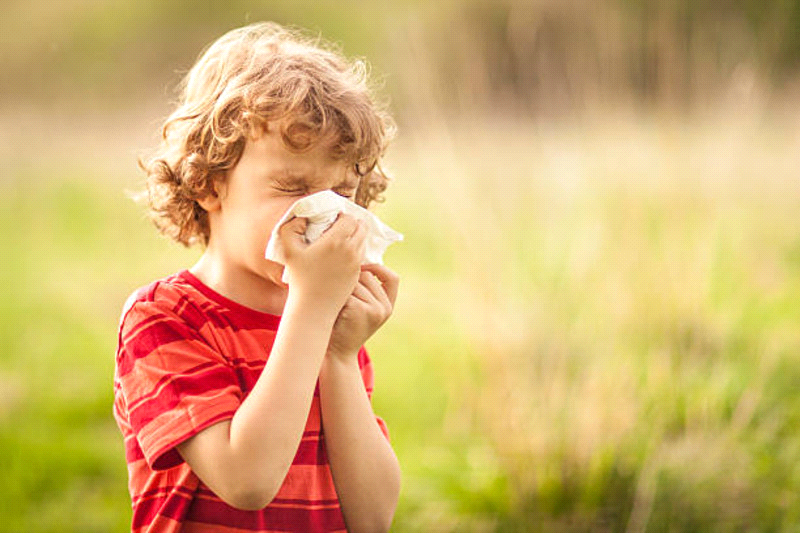Each year, millions of people suffer from allergies—and not just during the peak season. Allergies can be disruptive and frustrating for those afflicted with them, as well as their families. From common seasonal issues to long-term chronic conditions, there are a variety of treatments available that can help manage these irritating symptoms and prevent future flare-ups. But which ones work best? This comprehensive guide will offer an overview of the different types of allergy treatment currently available, so you can find the most effective approach for your situation.
1. Understanding Allergies: What's Going on Inside Your Body?

Before we dive into treatment options, let's unravel the fascinating world of allergens. Allergies arise when your immune system goes into overdrive, reacting to seemingly harmless substances like pollen, dust mites, or even certain foods. This exaggerated response sets off a cascade of symptoms, from sneezy noses to pesky skin rashes. Let's explore the intricate dance between our bodies and allergens!
2. Allergy Triggers: Identifying the Culprits
Embarking on the path to treatment starts with identification. Think of it as having a treasure map to navigate your way through. With this knowledge, you can steer clear of allergens whenever possible. From pesky pet dander to notorious pollen, sneaky mold, and even certain foods like peanuts or shellfish, being aware of your triggers brings you one step closer to relief.
3. Over-the-Counter (OTC) Solutions: Quick Relief at Your Fingertips
When pesky allergy symptoms strike, countless individuals rely on over-the-counter (OTC) medications to find relief. Antihistamines such as cetirizine (Zyrtec) or loratadine (Claritin) work wonders in swiftly easing sneezing and itching. For those struggling with congestion, nasal corticosteroid sprays like fluticasone (Flonase) come to the rescue.
4. Prescription Medications: When OTC Just Won't Cut It

When it comes to more severe allergies, sometimes over-the-counter remedies just won't cut it. That's where prescription medications come into play. Your doctor may prescribe you stronger antihistamines or corticosteroids, which can bring much-needed relief to those stubborn symptoms that just won't quit.
5. Immunotherapy: The Long-Term Allergy Solution
If you're seeking a lasting solution, immunotherapy could hold the key! This innovative treatment involves gradually exposing your immune system to tiny, controlled amounts of allergens. As time goes on, your body builds up tolerance, significantly reducing those pesky allergic reactions. Isn't that incredible?
6. Alternative Therapies: Exploring Natural Remedies
For those seeking a more holistic path to wellness, consider delving into the realm of alternative therapies. Explore the ancient art of acupuncture, a practice that involves stimulating specific points on the body to promote balance and healing. Harness the power of herbal supplements, natural remedies derived from plants that have been used for centuries to support various aspects of health.
And unlock the wonders of homeopathy, a system of medicine that treats ailments by stimulating the body's own healing mechanisms. Embrace the potential for relief and restoration, knowing that the effectiveness of these treatments can be as unique as you are, offering personalized approaches to well-being.
7. Allergy-Proofing Your Home: Creating a Safe Haven
Sometimes, even small tweaks to your daily routine can have a huge impact. Picture this: using allergen-proof covers on pillows and mattresses, giving your home a regular deep clean, and investing in an air purifier. These simple steps can work wonders in minimizing allergen exposure.
Transform your home into a cozy sanctuary, completely free from pesky allergies! During high pollen seasons, embrace the soothing ambiance of closed windows, employing high-efficiency particulate air (HEPA) filters to capture even the tiniest allergens.
For a truly allergy-proof living space, consider banishing your furry friends from bedrooms and creating a tranquil haven where you can breathe freely and enjoy uninterrupted rest. Your allergy-proof living space, meticulously designed for your comfort and well-being, awaits you!
8. Allergies in Children: Special Considerations
Children with allergies require special care and attention to ensure their well-being. It's important to seek guidance from a pediatrician or allergist who can provide expert advice on effectively managing their allergies. These allergies have the potential to significantly impact their quality of life. With personalized treatment strategies and ongoing support, we can empower these children to not just manage their allergies, but to thrive and live life to the fullest!
Conclusion:
Allergies can be irritating, but they don't have to control your life. With the right approach, you can find relief and keep your symptoms in check. Have a conversation with your doctor about which treatment options are best for you. With a bit of dedication and effort, you'll be back to breathing easy in no time.
FAQs
1. Can allergies be cured completely?
Allergies can't always be cured, but their symptoms can be effectively managed with the right treatment. Immunotherapy, in particular, has shown promising results in reducing allergy severity.
2. Is it safe to give allergy medications to children?
Many allergy medications are safe for children, but you should always follow the recommended dosage and consult with a pediatrician or pharmacist if you have any doubts.

Top Fresh Juices To Drink Early in the Morning For Health and Wealth!
Mar 27, 2024

How To Regain Control Of Your Night Snacking
Feb 12, 2024

How to cope with the stress of social isolation: A Complete Guide
Oct 15, 2024

Decoding Bone Spurs: The Facts, Tricky Aspects, and Management Strategies
Nov 02, 2023

Protein Debate: Plant-Based Versus Whey Protein - What's Better?
Feb 21, 2024

How Sleep Impacts Our Minds And Bodies: A Complete Understanding
Oct 15, 2024

Which Skin Care Ingredients are Suitable for Winter Use? Here's A List
Mar 14, 2024

7 The Best Ways To Live Your Best Life with Multiple Sclerosis
Jan 19, 2024

Granulated Sugar: Nutritional Insights and Health Implications
Dec 23, 2023

Diet For Psoriasis Sufferers: What To Eat And What To Avoid
Jan 13, 2024

A Comprehensive Guide For You to Check Your Skin’s Ph At Home
Mar 05, 2024

Unlocking the Benefits of Stretching
Dec 31, 2023